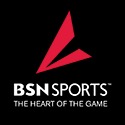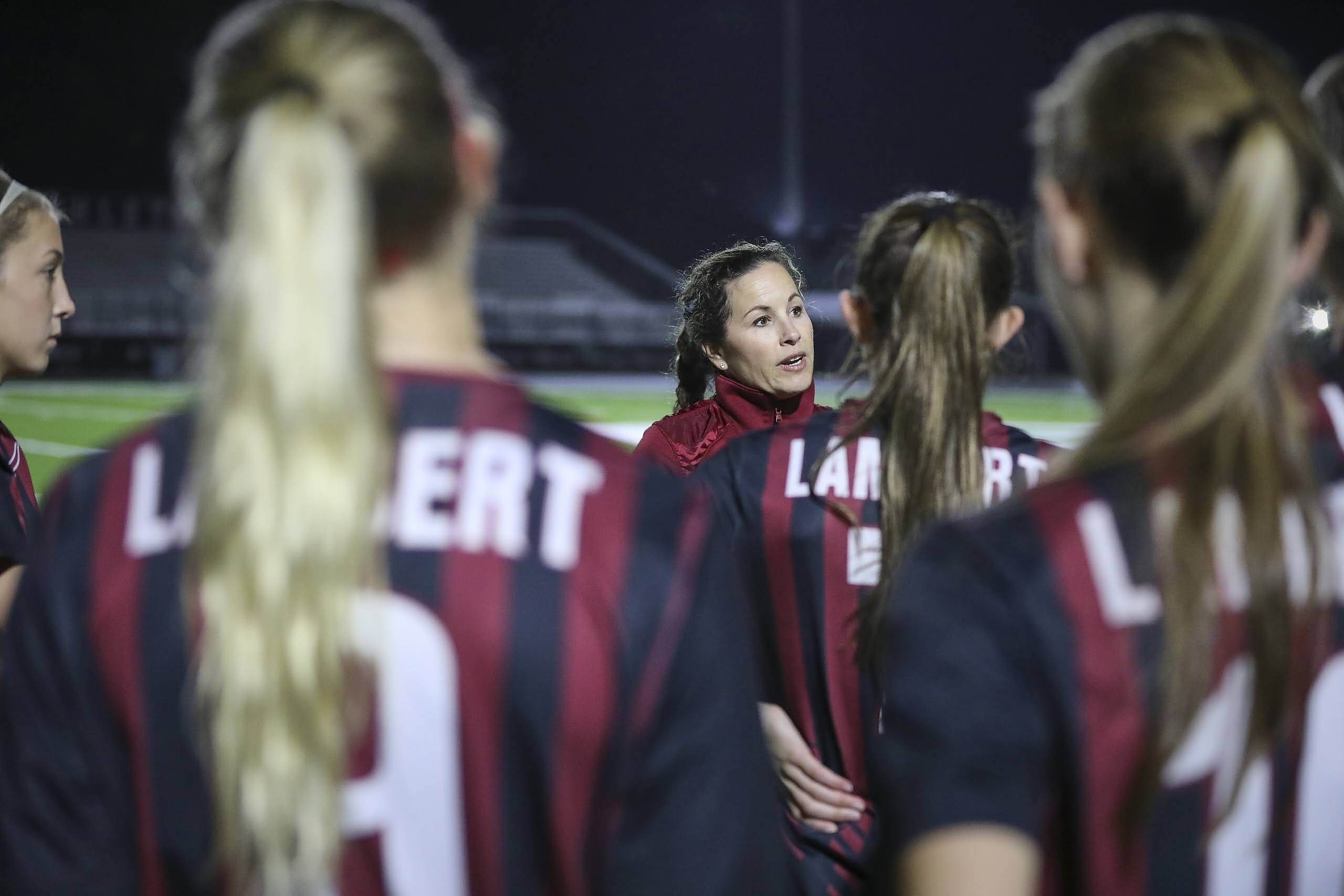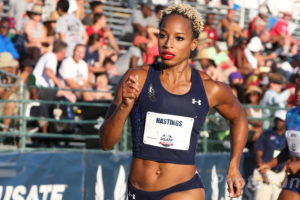Natasha Hastings
2X Olympic Gold Medalist, World & U.S. National Champion Track & Field sprinter
2003 USATF Junior Nationals winner & IAAF World Youth Championships winner, 400 meters
Watch our “Women’s Sports: An Athlete’s Perspective” webinar with Natasha Hastings now.
The following is an excerpt from our recent “Women’s Sports: An Athlete’s Perspective” webinar.
Q: How did you experience high school athletics, and how did those experiences shape your desires to play sports in college as well as professionally?
A: High school athletics was an interesting time. High school is where you figure things out. There are expectations and I realized I could go to college for free through sports. When I got into high school, I figured out people were watching me more and I was an example, and I did not really want that. It was tough because I was still a teenager and I still wanted to be a teenager. I had this athletic body, which was different from some of my other friends, and I really struggled with that. I was performing on the track, but I wasn’t feeling feminine. I was comparing myself to others and my body time didn’t fit my event. There were just a lot of internal struggles and it’s not until we get to adult life when we start talking to each other about those struggles.
Q: What advice would you give to coaches who are coaching girls who could be experiencing body issues?
A: My advice to coaches is it’s probably going to take you being uncomfortable to make your athlete comfortable. In my experience, I was never coached be a female, only male coaches. My coach in high school, Coach London, was awesome because he could have some conversations that were sometimes hard to have. For example, when we were on our cycles, he would recognize that, talk to us about it and then develop a program based around it. He recognized that we were different, and he recognized that he was going to be uncomfortable and just made himself available for those conversations.
Q: Was there a coach in your life that truly impacted your experience in this sport?
A: I had a couple of them. The two that I worked with the most were Coach Fry, my college coach, and Daryl Woodson, my professional coach, who I was with for ten years. Coach Woodson gave me the power to have a voice; our relationship was a collaboration. He would always hear me out when I came to him with suggestions. He gave me the power to use my voice and be heard. Overall, we were okay with me using my voice. This probably started back with Coach London and then prepared me for my future in college and professional sports. I am an athlete and I do better when I understand that. In high school, Coach London explained everything and took that time with me, but when I got to Coach Fry, it was sometimes hard for him; why was I asking questions? I had to explain I wasn’t questioning, I just needed to understand why. Those experiences just teach you as a coach; each athlete is different, and we all need different things. Overall, you need to be able to adapt.
Q: Were there any other role models in your life outside of sports?
A: My mom. She ran track as well and made the ‘84 Olympics, but she did not get to go because she got hit with a discus. Then she had me in ‘86 and I was named after her. In some ways, I feel like I am finishing what she didn’t get to. She was divorced from my dad, so raised my brother and me as a single mother. She was just a strong woman and handled it with so much grace. Next would be Serena and Venus Williams. I remember watching them growing up and just how they changed the game of tennis. Even now, they sometimes experience discrimination for what they are wearing, especially Serena, and she basically just says, “I am me and you are going to take me as I am, and I am going to dominate.” They were just game changers and that’s what did it for me.
Q: What are some areas coaches could focus on when learning how to coach women vs. men?
A: First and foremost, just recognize that we are different. I think sometimes we are trying to live up to men, and we aren’t men. We need to study who we are and recognize the differences and then we can go on and be successful. We are bad-ass, hardworking trailblazers, but we are not male athletes. You must recognize me as an individual; what makes my mind tick, what motivates me. Just look at the individual in front of you and take them for who they are.
Q: What advice would you give male coaches?
A: You must be mindful of the difference between women and men. Women have differences, and a perfect example of that is our period. You must account for those things. Things like that affect emotions, body, comfortability. You must be comfortable having those conversations, but then you must also adjust your coaching strategy, workout and plan based on those differences.
Another thing I believe, specifically for college: we must do a better job of how we educate our athletes about their bodies, including body image. We need to have conversations with them; they are so incredibly worried about performing well, being a certain weight, etc. We just need to help them understand that their bodies are different and that it’s okay.
Q: In high school, what do you think are some of the biggest barriers they face, and what are some things coaches can do to help them?
A: I think peer pressure; in my own experience, you make comparisons. I remember senior prom, I had to make choices specific to sports and didn’t get to go to the after party. It was hard for me to make those sacrifices, but my coaches and my family helped me realize the big goal. I do think we have to show kids that there is life beyond sport, but sport can be that thing that helps you get there. At my foundation, we like to talk about how a lot of people at the corporate level played sports, so just note that sports is transferable and we have to help our athletes see that.
Q: What does your foundation’s tagline, “To be a starting block for young girls to become confident women in sport and life,” mean to you?
A: That it’s bigger than sports. Sports is the platform; sports are the springboard. It does build confidence, relationships; it builds so many things. But it’s not the end-all-be-all. At Under Armour, Kevin [Plank] had this great idea in sports, but it was bigger than sports. It’s really about life, how you can feel like your best self, grow into your best self, but overall, it’s just about life. Those are the things that you carry on beyond the track. My relationship with my coaches goes beyond the track. So, it’s about life, being confident, and there is stuff you can learn from sports, but it goes beyond this.
Q: How do you think coaches can use this tagline?
A: To be a starting block. Here we are at the start. We are going to give you a great start, great foundation, tools to apply to life, and we want you to be confident not just on the track, etc., but in life as well. If you can be confident here, you can do that same thing in life.
Q: Can you speak about your journey into motherhood and your continued journey being a professional athlete?
A: Motherhood is an experience that you don’t know till you know and you’re in it. The journey is so personal and all you want to do is protect it. This idea that you are growing this human being inside of you, you are supposed to be happy, but you think: am I sure about this? How is it going to change my life? There is this expectation with pregnancy that you are supposed to be so excited, but I think we need to get to a space where it’s okay to not feel or experience pregnancy in this way. Then the baby comes along, and you are so in love, but then you start to put all this pressure on yourself. Motherhood can be such a beautiful thing, but it is also such a judgmental space. So, one thing I quickly realized is that not one of us know what the heck we are doing. We just need to understand that and just be there to support each other.
Q: What advice would you give coaches teaching female athletes?
A: You must be willing to be taught. This generation “us” women having our own voice is important. Allow these kids to be teenagers, but yes, you teach, but also give them a voice. No one can ever want it more than them. Today we see a lot of overtraining, but if we really want to cultivate and grow this generation, we must be mindful and give them the space to be who they are. But also give them the space to take on a little risk. If we train too much or want it more than them, they could experience physical and mental burn out. If you take away anything, just make sure your athletes are having a good time. We have to figure out a way to make it enjoyable.
Watch our “Women’s Sports: An Athlete’s Perspective” webinar now.


